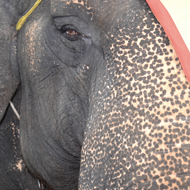Sambo's death should be a 'wake up call'

Animal welfare groups have long campaigned against elephant riding and 114 global companies have recently agreed not to offer visits to venues with elephant rides and shows. (stock photo)
The recent death of an elephant being used to ferry tourists to the Angkor Wat Temple complex in Cambodia has prompted an outpouring of grief around the world, and campaigners are now calling for a ban on elephant rides at the archeological park.
A petition on Change.org has already received more than 58,000 signatures.
Elderly elephant Sambo is reported to have collapsed and died on Friday (22 April), after ferrying tourists in temperatures of around 40ºC (104ºF).
Speaking to AFP news agency, the owner of Angkor Elephant Company, Oan Kiri, said veterinarians had attributed Sambo's death to heart failure as a result of stress caused by the temperature.
The remaining elephants' working hours will now be reduced until the temperature drops, he added.
Sambo had been working for around 45 minutes and had walked 2.1km (1.2 miles), when she collapsed on her way to an enclosure. She was thought to be around 40-45 years old, which is towards the end of an Asian elephant's lifespan.
Animal welfare groups have long campaigned against elephant riding and 114 global companies have recently agreed not to offer visits to venues with elephant rides and shows, thanks to campaigning by World Animal Protection.
Sambo's death triggered the Change.org petition, which calls on the Authority for the Protection and Management of Angkor and the Region of Siem Reap (APSARA) to ban elephant riding.
Campaigners say the elephant's death should be 'a final wake up call' for the tourism industry.
'There is no such thing as cruelty-free elephant rides,' the petition says. 'Tourists may think that riding an elephant on holiday does not cause harm - you often can't see the cruelty - it's hidden from view. What you don't realise is that a "once in a lifetime" or "bucket list" item for you, means a lifetime of misery for wild animals.'



 The veterinary mental health charity Vetlife is inviting the veterinary community to join it for a sponsored cold-water dip.
The veterinary mental health charity Vetlife is inviting the veterinary community to join it for a sponsored cold-water dip.